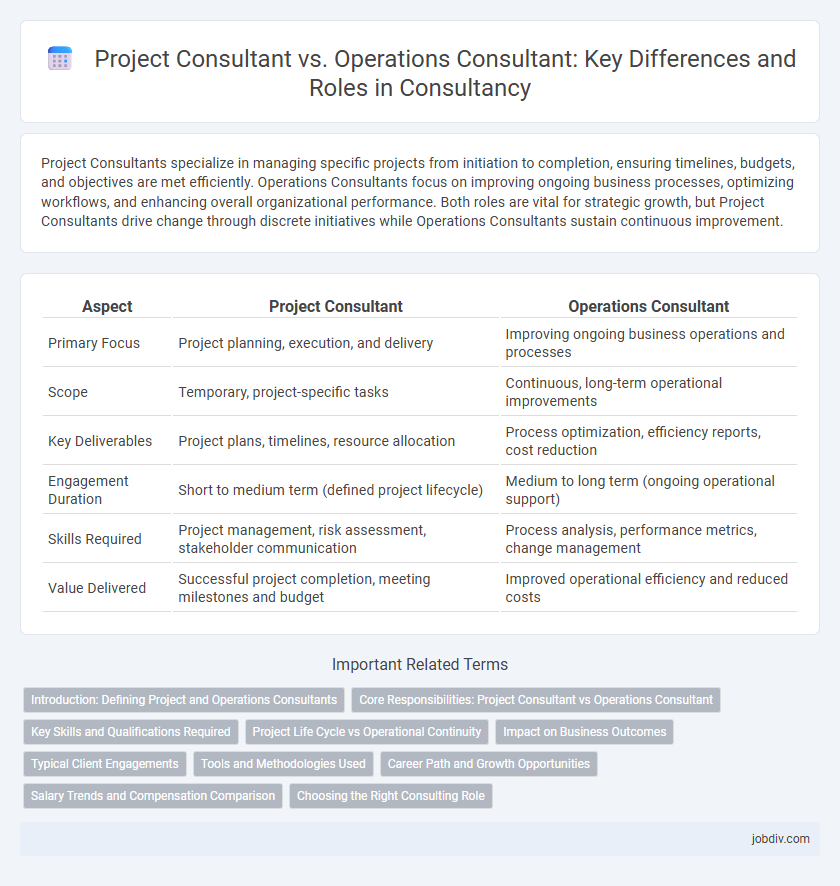Project Consultants specialize in managing specific projects from initiation to completion, ensuring timelines, budgets, and objectives are met efficiently. Operations Consultants focus on improving ongoing business processes, optimizing workflows, and enhancing overall organizational performance. Both roles are vital for strategic growth, but Project Consultants drive change through discrete initiatives while Operations Consultants sustain continuous improvement.
Table of Comparison
| Aspect | Project Consultant | Operations Consultant |
|---|---|---|
| Primary Focus | Project planning, execution, and delivery | Improving ongoing business operations and processes |
| Scope | Temporary, project-specific tasks | Continuous, long-term operational improvements |
| Key Deliverables | Project plans, timelines, resource allocation | Process optimization, efficiency reports, cost reduction |
| Engagement Duration | Short to medium term (defined project lifecycle) | Medium to long term (ongoing operational support) |
| Skills Required | Project management, risk assessment, stakeholder communication | Process analysis, performance metrics, change management |
| Value Delivered | Successful project completion, meeting milestones and budget | Improved operational efficiency and reduced costs |
Introduction: Defining Project and Operations Consultants
Project consultants specialize in managing specific initiatives by planning, executing, and delivering defined project outcomes within set timelines and budgets. Operations consultants focus on enhancing ongoing business processes, improving efficiency, and optimizing day-to-day functions to achieve long-term organizational performance. Both roles require distinct expertise, with project consultants driving change through temporary efforts and operations consultants ensuring sustained operational excellence.
Core Responsibilities: Project Consultant vs Operations Consultant
Project Consultants focus on defining project goals, developing strategic plans, managing timelines, and ensuring deliverables meet client specifications within budget constraints. Operations Consultants analyze and optimize business processes, improve operational efficiency, implement system enhancements, and support change management initiatives across functional departments. Both roles require strong problem-solving skills, but Project Consultants emphasize project lifecycle management while Operations Consultants prioritize continuous process improvement.
Key Skills and Qualifications Required
Project Consultants require expertise in project management methodologies, risk assessment, and stakeholder communication, often holding certifications like PMP or PRINCE2. Operations Consultants must demonstrate strong analytical skills, process optimization knowledge, and proficiency in Lean Six Sigma or similar frameworks to enhance organizational efficiency. Both roles demand excellent problem-solving abilities and experience in change management to drive successful business outcomes.
Project Life Cycle vs Operational Continuity
Project Consultants specialize in guiding initiatives through the project life cycle phases, including initiation, planning, execution, monitoring, and closure, ensuring timely delivery and scope adherence. Operations Consultants focus on enhancing operational continuity by optimizing processes, reducing costs, and improving efficiency within ongoing business functions. While Project Consultants drive temporary change for specific goals, Operations Consultants maintain and improve the steady state of organizational performance.
Impact on Business Outcomes
Project consultants drive business outcomes by delivering strategic initiatives on time and within budget, ensuring tangible improvements in efficiency and profitability. Operations consultants optimize ongoing processes, enhancing productivity and reducing costs through continuous workflow improvements. Both roles significantly impact business success by targeting different phases of organizational change and performance enhancement.
Typical Client Engagements
Project Consultants typically engage with clients on specific initiatives such as product launches, system implementations, or organizational restructuring, offering expertise in planning, execution, and risk management. Operations Consultants usually work on ongoing process optimization, efficiency improvements, supply chain management, and operational cost reduction to enhance day-to-day business performance. Both roles require tailored strategies but differ in focus, with Project Consultants delivering time-bound solutions and Operations Consultants driving continuous improvement.
Tools and Methodologies Used
Project consultants utilize tools such as Microsoft Project, Gantt charts, and Agile frameworks like Scrum and Kanban to plan, execute, and monitor project timelines and deliverables. Operations consultants often employ Lean Six Sigma methodologies, process mapping software like Visio, and ERP systems like SAP to optimize workflows, enhance efficiency, and reduce operational costs. Both roles leverage data analytics platforms including Tableau and Power BI for informed decision-making and performance tracking.
Career Path and Growth Opportunities
Project Consultants specialize in managing specific initiatives, providing expertise in planning, execution, and delivery within defined timelines, making their career path ideal for those who excel in project management and strategic problem-solving. Operations Consultants focus on optimizing business processes and improving organizational efficiency, offering growth opportunities through deep industry knowledge and continuous process innovation. Both roles offer distinct career trajectories: Project Consultants often advance toward program or portfolio management, while Operations Consultants typically move into operational leadership or strategy development roles.
Salary Trends and Compensation Comparison
Project consultants typically command higher average salaries, ranging from $85,000 to $130,000 annually, due to their specialized expertise in managing complex project lifecycles and delivering strategic outcomes. Operations consultants earn between $70,000 and $110,000, reflecting their focus on optimizing day-to-day business processes and improving operational efficiency. Compensation packages for project consultants often include performance bonuses linked to project milestones, while operations consultants benefit from steady salary increments aligned with operational improvements and cost-saving achievements.
Choosing the Right Consulting Role
Selecting the right consulting role depends on organizational needs and individual expertise, where a Project Consultant specializes in managing specific initiatives with defined timelines and deliverables, ensuring project success through strategic planning and execution. In contrast, an Operations Consultant focuses on optimizing ongoing business processes, enhancing efficiency, and implementing sustainable improvements across organizational functions. Understanding the distinct skill sets and impact areas of Project versus Operations Consultants enables businesses to align consultancy efforts with their strategic goals for maximum value creation.
Project Consultant vs Operations Consultant Infographic

 jobdiv.com
jobdiv.com